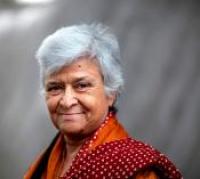The personal and political



Looking at this photograph (left) of my mother Sukanya and daughter Meeto from some 25 years ago takes me back to a different era of our activism. The photo I think is from 1985, a year after the anti-Sikh riots, from a demonstration for peace and secularism at India Gate, New Delhi. We had all decided to wear white, and, as you can see, my mother and Meeto abided by the dress code too. You can see my mother playing the dholak; she used to play it and sing the movement’s songs whenever she was with us. She had known Abha for many years and also got to know others with her involvement. The presence of three generations at this march speaks about a specific personal and political context. During this event, we sang peace songs. We were expressing our grief and anger at the killing of innocent Sikhs after Indira Gandhi’s murder. A lot of people joined us at this event. Many people and organizations worked for the rehabilitation of Sikhs in Delhi for many years thereafter. Many of us worked with Nagrik Ekta Manch to promote communal harmony and peace.
Children, spouses and even household help of many activists were part of our struggles. They contributed and participated in many ways. Some activists’ children even went on to adopt this as their passion and work. For example, Kumkum Sangari’s son Dhruv, who grew up listening to debates on secularism and pluralism, has become a Sufi singer. My daughter Meeto started working on human rights and secularism as an activist and scholar. Lalita Ramdas’s daughter Sagari studied to be a Veterinary Surgeon and started an NGO in Andhra Pradesh for the welfare of animals and people making their living on animal husbandry. I can go on adding names…Gauri Chowdhri’s driver too was an integral part of all our demonstrations and other activities.
If homes are locations of activism, families cannot be far behind.
Those were the times when our activism was not funded; so it had no infrastructure for support. Since we neither had any organizations to run nor any offices to run those from, upper-class members of our groups provided the space and resources for work (this, of course, created its own power dynamics and concerns). We would meet in their homes from where the offices of our collective groups functioned. This is what I mean: Saheli functioned out of Gauri’s home, Jagori ran from Abha’s. The homes of Renuka Mishra, Buchy Rao, Lolly Ramdas as well as my home were used for meetings, rehearsals for street plays and so on. The personal and the public converged, though also out of necessity.
Since our activism took place in the homes of friends, many of our families were drawn into our activism. Activism for us was part of our personal lives, and not a separate arm outside it. My daughter Meeto was about 18 months old and perched on her father’s shoulder when she participated in an anti-rape demonstration and carrying a placard saying Balaatkaar Mitao, Mera Bhavishya Bachao (Stop Rape, Give me a Secure Future). In fact, most of our socializing was also with other activists. If Jagori’s work took place after office hours or during family time, the children were around. Our friends were maasies and mamas (maternal aunts and uncles) for our children. Some of our homes also hosted feminists from other cities and countries. During those days, we seldom stayed in hotels or had meetings in fancy hotels or conference venues like the IIC and IHC. We neither had funds nor did we think it was appropriate to meet in expensive hotels. (This trend of well-funded NGOs hosting their meetings and stays in fancy hotels started around mid and late 1990s. I think it changed the NGO culture for the worse. Fortunately, some NGOs still avoid indulging themselves like this. Jagori, in fact, went on to start a training/meeting facility in Himachal as an alternative to hotel culture).


These photos are from a Jagori picnic in Lodhi Garden. It of course must have been a Sunday. So my daughter Meeto joined me in the picnic as you can see her in the photo. My mother lived with me after my father passed away and so she was there with us too. These picnics were what organizations today do and call RETREATS. We socialized with each other, bonded, got to know our families. We played games like tug of war, satolia and of course, we sang and danced. Food came from our homes. These retreats were costless because all of us contributed. Once, when I had travelled to Uttar Pradesh for a residential workshop on street theatre, Meeto had accompanied me. She must have been observing all of us during the workshop chatting and laughing. Puzzled, she came up to me and asked “Ma, when will you start working?” Clearly, there was no difference between “work” and “non-work”.



